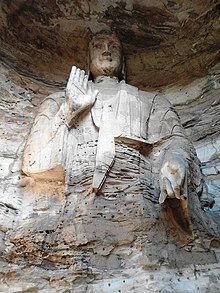| Emperor Daowu of Northern Wei 北魏道武帝 | |||||||||||||||||
|---|---|---|---|---|---|---|---|---|---|---|---|---|---|---|---|---|---|
 Statue of Emperor Daowu at Yungang Grottoes | |||||||||||||||||
| Emperor of Northern Wei | |||||||||||||||||
| Reign | February 20, 386[1] – November 6, 409 | ||||||||||||||||
| Successor | Emperor Mingyuan | ||||||||||||||||
| Born | August 4, 371 | ||||||||||||||||
| Died | November 6, 409 (aged 38) | ||||||||||||||||
| Burial | Jin Mausoleum of Shengle (盛樂金陵) | ||||||||||||||||
| Consorts | Empress Murong | ||||||||||||||||
| Issue | Emperor Mingyuan Tuoba Shao Tuoba Xi Tuoba Yao Tuoba Xiu Tuoba Chuwen Tuoba Lian Tuoba Li Tuoba Hun Tuoba Cong Princess Huayin | ||||||||||||||||
| |||||||||||||||||
| House | Tuoba | ||||||||||||||||
| Dynasty | Northern Wei | ||||||||||||||||
| Father | Tuoba Shi | ||||||||||||||||
| Mother | Lady He | ||||||||||||||||
Emperor Daowu of Northern Wei ((北)魏道武帝; 4 August 371[2] – 6 November 409[3]), personal name Tuoba Gui (拓拔珪), né Tuoba Shegui (拓拔渉珪), was the founding emperor of the Northern Wei dynasty of China.[4] He was the grandson of the last prince of Dai, Tuoba Shiyiqian. After the fall of the Dai state to the Former Qin in 376, he was presumed to be the eventual successor to the Dai throne. After the Former Qin fell into disarray in 383 following its defeat by Eastern Jin forces at the Battle of Fei River, Tuoba Gui took the opportunity to reestablish Dai in 386. He soon changed the dynasty's name to Wei and declared himself a prince. He was initially a vassal of the Later Yan, but after defeating Later Yan emperor Murong Bao in 397 and seizing most of Later Yan's territory, he claimed the imperial title in 398.
Emperor Daowu was commonly regarded as a brilliant general, but cruel and arbitrary in his rule, particularly toward the end of his reign. In 409, as he considered killing his concubine Consort Helan, his son Tuoba Shao (拓拔紹) the Prince of Qinghe, by Consort Helan, killed him, but was soon defeated by the crown prince Tuoba Si (Emperor Mingyuan) who then took the throne.
- ^ wushen day of the 1st month of the 1st year of the Dengguo era, per Emperor Daowu's biography in Book of Wei
- ^ 7th day of the 7th month of the 34th year of the Jian'guo era, per Emperor Daowu's biography in Book of Wei
- ^ wuchen day of the 10th month of the 6th year of the Tian'ci era, per Emperor Daowu's biography in Book of Wei
- ^ Grousset, Rene (1970). The Empire of the Steppes. Rutgers University Press. pp. 60. ISBN 0-8135-1304-9.